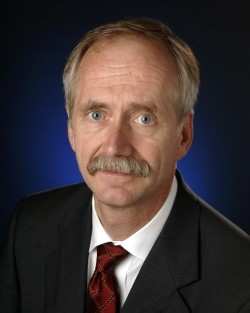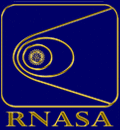Recipient Of The Rotary National Award For Space
Achievement
 The Board of Advisors of the Rotary National Award for Space
Achievement (RNASA) Foundation has selected NASA Associate
Administrator for Space Operations, William (Bill) H. Gerstenmaier
(pictured), as the recipient of the 2010 National Space Trophy. As
Associate Administrator, Gerstenmaier is responsible for oversight
of all NASA's Space Shuttle, International Space Station (ISS),
space launch services programs, the astronaut crew health program
and the communication systems network.
The Board of Advisors of the Rotary National Award for Space
Achievement (RNASA) Foundation has selected NASA Associate
Administrator for Space Operations, William (Bill) H. Gerstenmaier
(pictured), as the recipient of the 2010 National Space Trophy. As
Associate Administrator, Gerstenmaier is responsible for oversight
of all NASA's Space Shuttle, International Space Station (ISS),
space launch services programs, the astronaut crew health program
and the communication systems network.
Rodolfo Gonzalez, President of the RNASA Foundation in Houston,
Texas, reported that Gerstenmaier was nominated for "his unwavering
commitment and remarkable contributions to human space flight and
providing outstanding leadership and direction to the exploration
of space through his contributions to the Space Shuttle and
International Space Station programs."
Director of NASA Langley Research Center in Virginia, Mrs. Lesa
B. Roe, former NASA Administrator Mike Griffin, Johnson Space
Center Director Mike Coats, and RNASA Advisor and Apollo 17
Astronaut Harrison Schmitt nominated Gerstenmaier.
Roe said, "Gerstenmaier's career achievements and personal
initiatives have had a direct impact on the current U.S. human
space flight program, the international community, and residents of
planet Earth. His efforts will continue to shape the future of
space exploration for many years to come."
"It was my honor to work with Bill for four years," said
Griffin, who received the National Space Trophy last year. "Quite
simply, Bill Gerstenmaier is regarded as the ultimate authority on
the Space Shuttle and International Space Station. When he says
something, people listen, and they know that what he says is
true."
Coats added, "Bill's impact in the space community is
unparalleled. He has literally guided an international group of
thousands of individuals in many countries in furthering human
space flight and assuring a continued human presence in space. The
partnerships we currently enjoy with our international partners for
the ISS are largely due to Bill's tremendous efforts and
diligence."
 Schmitt noted that "Gerstenmaier has masterfully carried the
primary senior management responsibility (since 2005) for the
success of Space Shuttle and International Space Station
activities."
Schmitt noted that "Gerstenmaier has masterfully carried the
primary senior management responsibility (since 2005) for the
success of Space Shuttle and International Space Station
activities."
William H. Gerstenmaier is the Associate Administrator for Space
Operations at NASA Headquarters in Washington, DC. In this
position, Gerstenmaier directs NASA's human exploration of space.
He also has programmatic oversight for the International Space
Station, Space Shuttle, space communications and space launch
vehicles.
Gerstenmaier began his NASA career in 1977 at the Lewis (now
Glenn) Research Center in Cleveland, performing aeronautical
research. He was involved with the wind tunnel tests that were used
to develop the calibration curves for the air data probes used
during entry on the space shuttle.
Gerstenmaier moved to Houston in 1980 to work at the Johnson
Space Center (JSC). He served as a Propulsion Officer in the
Mission Control Center during the early Space Shuttle program.
Beginning in 1988, Gerstenmaier headed the Orbital Maneuvering
Vehicle (OMV) Operations Office.
Subsequently, he headed Space Shuttle/Space Station Freedom
Assembly Operations Office and served as Chief, Projects and
Facilities Branch, Flight Design and Dynamics Division.
Gerstenmaier also served as Shuttle/Mir Program Operations
Manager from 1995 to 1997. During this time, he acted as the
primary liaison to the Russian Space Agency for operational issues
and negotiated all protocols used in support of operations during
the Shuttle/Mir missions. In 1997, the Rotary National Award for
Space Achievement (RNASA) Foundation honored him with a Stellar
Award in the Mid-Career category for his work on the Phase 1 Mir
program.
In 1998, Gerstenmaier became manager of Space Shuttle Program
Integration, where he had responsibility for the overall
management, integration, and operations. In December 2000, he was
named deputy manager of the International Space Station Program. He
was named International Space Station program manager in 2002. He
became NASA Associate Administrator for Space Operations in 2005
and continues in that capacity today.
 ANN FAQ: Contributing To Aero-TV
ANN FAQ: Contributing To Aero-TV Aero-News: Quote of the Day (12.10.25)
Aero-News: Quote of the Day (12.10.25) ANN's Daily Aero-Term (12.10.25): North Atlantic High Level Airspace (NAT HLA)
ANN's Daily Aero-Term (12.10.25): North Atlantic High Level Airspace (NAT HLA) Airborne 12.08.25: Samaritans Purse Hijack, FAA Med Relief, China Rocket Fail
Airborne 12.08.25: Samaritans Purse Hijack, FAA Med Relief, China Rocket Fail Airborne-Flight Training 12.04.25: Ldg Fee Danger, Av Mental Health, PC-7 MKX
Airborne-Flight Training 12.04.25: Ldg Fee Danger, Av Mental Health, PC-7 MKX




